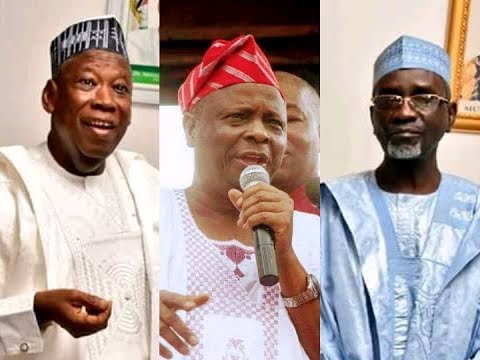Opinion
Shekarau, Kwankwaso And The Politics of Zero Principle
By Emmanuel Aziken

The political landscape in the country was enlivened last Monday after the penultimate governor of Kano State, Mallam Ibrahim Shekarau defected from the New Nigerian Peoples Party, NNPP to the Peoples Democratic Party, PDP.
The defection of Mallam as he used to be popularly called in the days of yore was his second entry to the PDP.
Remarkably, the movement came barely after three months of habitation in the still fledgling NNPP, a party that has yet to find traction besides the one-man gravitation it is pulling in Kano and perhaps Akwa Ibom.
In Kano, the national leader of the party, Senator Rabiu Kwankwaso is generally identified as the emblem. Another state where the party is pulling traction is in Akwa Ibom where the one man insurgency by Senator John James Akpanudoedehe is also exploiting the internal dissensions in the state chapters of the PDP and the All Progressives Congress, APC.
Why Shekarau left the NNPP for his vomit in the PDP reflects the ideological vagueness and shallowness that is characteristic of the political class in the country.
Shekarau, a former civil servant who was at one time praised for his honesty in the way that the then taciturn Muhammadu Buhari was hailed as the epitome of prudence and integrity, was the linchpin Buhari used to turn himself into an idol in Kano.
Shekarau and Buhari combined to oust Kwankwaso as governor in 2003. After riding on the Buhari bandwagon to win re-election, Shekarau not long after fell away and came into himself.
That betrayal was among reasons Buhari left the All Nigerian Peoples Party, ANPP to form the Congress for Progressive Change, CPC.
Shekarau did not mind taking on his erstwhile mentor, Buhari in the 2011 presidential election with Chief John Odigie-Oyegun as his running mate.
Those in the know suspect that it was because of this alliance between Shekarau and Odigie-Oyegun that Buhari was said to be uncomfortable with Asiwaju Bola Tinubu’s decision to impose Odigie-Oyegun as chairman of the APC after the tenure of the interim national chairman, Chief Bisi Akande.
Indeed, at that time also, as the APC was being formed in 2013, Kwankwaso and others who plotted against President Goodluck Jonathan decided to perch with the new party.
Once Kwankwaso and the New Peoples Democratic Party, nPDP joined the new APC, Shekarau made his exit, despite the insistence of some like Odigie-Oyegun that he would be protected.
Indeed, the exit of Kwankwaso with Rotimi Amaechi from the PDP meant that for the first time since the advent of the Fourth Republic that the PDP would be without the three leading states with the highest votes; Lagos, Kano and Rivers.
So, it was not a surprise that Shekarau’s defection to the PDP became a godsend to the PDP in 2013.
He was immediately appointed minister and with it a shaking of the traditional PDP structure in Kano had been in the hands of Aminu Wali and other leaders.
Kwankwaso who joined the APC with the presidential ticket in mind did not find favour with Tinubu who had reserved it for Buhari while waiting for his own turn in 2023.
Meanwhile, Shekarau could not provide a bulwark against the Buhari tsunami in Kano in the 2015 election that was swept by the APC.
Relatedly, Dr Abdullahi Ganduje, a one-time faithful loyalist of Kwankwaso’s and cheer leader of the Kwankwasiya movement had in 2015 emerged as governor at the behest of Kwankwaso. However, in the tradition of Kano politicians in power Ganduje also rebelled against his former principal.
With Ganduje taking over the party structure despite the strenuous objections of deep-seated Kwankwasiya operatives in government and legislature including a deputy governor who was forced out, Kwankwaso in 2018 returned to his vomit in the PDP.
Besides seeking the presidential ticket of the PDP, he also sought to foist a new governor on Kano.
The outcome of the elections in Kano remain steeped in controversy, but the Independent National Electoral Commission, INEC returned the APC victorious but other independents including international agencies thought the process was murky. The US Embassy on account of the issues in Kano included some high level actors in that process when it slapped a visa ban on ten Nigerian political actors.
Kwankwaso’s return to the PDP in 2018 also forced Shekarau to leave the PDP for his original vomit in the APC on whose platform he stood for election and won in 2019.
However, approaching 2023, Ganduje and a significant proportion of the political class, including Senator Barau Jibrin among others challenged what they thought as Ganduje’s attempt to become another Kwankwaso in Kano.
The action of the incumbent governor forced Shekarau into the hands of Kwankwaso in an alliance that was once thought improbable.
Shekarau has narrated how his allies were shortchanged in the bargain for tickets on the banner of the NNPP. According to him, for several weeks, Kwankwaso kept shifting meetings that would include his allies in the list of NNPP candidates. That was until the deadline passed.
With only him having a ticket in the NNPP, Kwankwaso had apparently kept him for the roasting. He has now sensibly withdrawn himself and returned to his former vomit in the PDP. He may have sacrificed his ticket, but he has also saved himself from the greater humiliation of servitude to Kwankwaso.
The pursuit of personal ambition and goals is the lesson of the politics of Shekarau and Kwankwaso. It is so far from the politics of that great politician whose name will continue to resonate in the chronicles of ideological politics and service: Mallam Aminu Kano.
Send Us A Press Statement Advertise With Us Contact Us
And For More Nigerian News Visit GWG.NG

